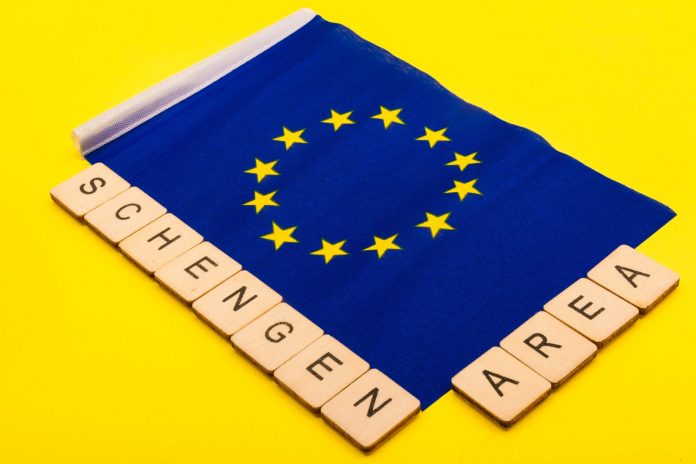The Schengen Area, the largest border control-free travel area in the world, may soon expand to include at least one new member, if not three. So far, the area consists of 22 EU member states and four non-EU countries. Now three more EU members are knocking on Schengen’s door – Croatia, Bulgaria and Romania, reports Agerpres.
Of the 27 EU member states, Bulgaria, Romania, Croatia, Cyprus and Ireland are currently not part of the Schengen zone. However, Iceland, Norway, Switzerland and Liechtenstein, which are not members of the EU, are included. The Czech Presidency of the Council of the EU has indicated that it wants Croatia, Bulgaria and Romania to join the border control-free Schengen zone together.
It is expected that the Council of the EU will vote on this matter on December 9. The accession of new countries to Schengen requires a unanimous decision.
The youngest EU member, Croatia, which joined in 2013, is on the verge of adopting the euro. Croatia is on the right track to becoming a member of the Schengen Area, given that so far there have been no announcements, at least no public ones, from any Schengen member that would veto.
Romania and Bulgaria have been waiting since 2011. The Council of the EU and the EU Parliament confirmed in June 2011 that Bulgaria and Romania met all the criteria for joining Schengen. However, in September of that year, the Netherlands and Finland vetoed the countries’ accession, citing insufficient action against corruption and organized crime as the reason.
On October 18, 2022 – for the fourth time since 2018 – the EU Parliament called on the member states in the Council of the EU to integrate Romania and Bulgaria into the Schengen zone without delay.The Netherlands continue to question the readiness of Bulgaria and Romania. In October 2022, the Dutch Parliament adopted a resolution to oppose the accession of Bulgaria and Romania to the Schengen Area. It stressed the need for further analysis of the functioning of the rule of law and deemed it necessary to check whether and to what extent corruption and organized crime had been reduced in these two countries. „If these issues are unresolved in a Schengen state, this can cause serious problems in the absence of border controls and thus represents a risk for the security of the Netherlands and the entire Schengen Area”, the resolution states.
Due to widespread corruption, the legal authorities in Romania and Bulgaria have been specially monitored by the EU Commission since their accession to the bloc in 2007. The EU Parliament described the current arrangements as harmful to the European Single Market. „Maintaining internal border controls is discriminatory and has a serious impact on the lives of mobile workers and citizens”, MEPs said.
Romania’s Foreign Minister Bogdan Aurescu believes that there is still room for political, diplomatic and technical steps.”I am convinced that the Dutch side is evaluating absolutely all options and variants”, Aurescu said.
According to MEP Victor Negrescu, there are three potential scenarios with regard to Romania’s Schengen accession:
- The first scenario would be a positive vote on Romania’s accession to the Schengen Area by the Justice and Home Affairs Council on December 9. In this case, the Netherlands, if they remained the last country without a clear position, would vote in favour of accession, but with the imposition of conditions, perhaps supported by other European countries. They could ask the EU Commission to develop a special monitoring mechanism, under which some of the rights specific to the Schengen Area could be suspended if certain provisions were violated.
- In the second scenario the vote would be rescheduled to an exceptional session of the Council later this year, to await the conclusions of the latest Cooperation and Verification Mechanism (CVM) report and the opinion of the Venice Commission on the Justice Laws. The Commission established the CVM as a transitional measure to help Romania address deficiencies in the field of justice and in taking action against corruption. In this case, Romania’s entry into the Schengen zone would still be conditional on criteria that have nothing to do with the Schengen acquis. The decoupling of the decision on Bulgaria from that on Romania is also being evaluated, says the Romanian MEP.
- In the third scenario the vote on Romania’s and Bulgaria’s entry into the Schengen Area could be rescheduled until after the elections in the Netherlands in March 2023 have taken place.
As far as Croatia is concerned, the Council of the European Union initiated the decision-making process on the admission of the country to the Schengen area back in June, requesting the opinion of the European Parliament. Although this opinion is not binding on the Council, it is a required procedural step and also sends a political message. The Council of the EU proposed to abolish controls where Croatia borders with Schengen countries on land and sea from January 1, 2023. Controls at airports are to follow suit from March 26, 2023.
At the plenary session on November 10, the European Parliament voted in favor of Croatia’s entry into Schengen. This was the penultimate step towards the final decision, which is expected on December 9 at the meeting of the interior ministers of the member states.
Slovenia supports Croatia’s membership of the Schengen Area. However, the fate of the border arbitration agreement of 2017 is uncertain. This agreement determined the course of the land and sea border, after the two countries failed to find a solution themselves for more than two decades.
Croatia now insists that it is no longer a party to the arbitration, since there had been procedural irregularities perpetrated by Slovenia. Ljubljana, on the other hand, insists that the arbitral award is the final judgment on the course of the border.
Slovenian politicians have often more or less openly discussed the possibility of making Croatia’s Schengen zone membership conditional on the implementation of the border arbitral award. In recent weeks, rumours have surfaced that the Slovenian government is drafting a unilateral statement to the effect that by joining the Schengen Area, Croatia is accepting the arbitral award. ‘We are talking about the adoption of a statement, but this statement will be nothing but a renewed commitment to the implementation of the arbitral award,’ Slovenian Foreign Minister Tanja Fajon said last week. Fajon, who expects a positive political decision regarding Croatia’s Schengen Area membership by the EU’s Interior Ministers, also announced that the Slovenian government will soon adopt a draft position that will then be put to a vote at the parliament in Ljubljana.
Croatia joining Schengen is a particular challenge for Bosnia and Herzegovina (BiH), which shares almost a thousand kilometers of border with Croatia. There are strong economic, cultural and familial connections between the two countries. BiH fears that Schengen rules might ‘reinforce’ the border between the two neighboring countries.
Tradesmen expect problems in the speed of flow of goods across the border with Croatia. There are nine border checkpoints between BiH and Croatia and 20 permanent crossings for cross-border traffic. Out of the nine checkpoints, only two have the special status to perform phytosanitary controls. These are used to export fruit, vegetables and all other goods that require this type of inspection. The Foreign Trade Chamber of BiH warned on several occasions that the implementation of Schengen inspection standards may create waiting lines and delays of trucks carrying goods that are exported from BiH. They call for better adjustment to new circumstances during border crossing.
Nevertheless, the BiH Border Police state that there should not be any significant changes for BiH citizens entering Croatia. What they see as an advantage of Croatia joining Schengen is better supervision of a shared border that has been burdened by the migrant crisis. ‘Croatia’s membership of Schengen would ensure the meeting of all criteria and thereby a very high level of security of the country’s external borders. This is especially significant in the prevention of all forms of cross-border crime and illegal crossings in the context of the current migrant crisis,’ BiH Border Police told FENA.
Supported by the EU, Croatia has invested in border protection. The country’s borders are guarded by 6,500 police officers. Non-governmental organizations and media repeatedly reported on violent returns and inhumane treatment of illegal migrants by Croatian authorities. As a result, the country – in cooperation with civil society organizations – initiated an independent supervision of border police behaviour towards migrants and asylum seekers. Such supervision mechanisms, according to the proposal of the Commission of the European Pact on Migration and Asylum, should be in place in all member states.
https://universul.net/iohannis-macron-talk-schengen-at-paris-peace-forum/https://universul.net/iohannis-macron-talk-schengen-at-paris-peace-forum/

















